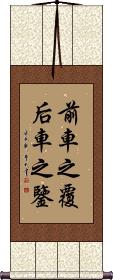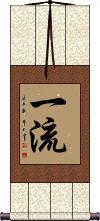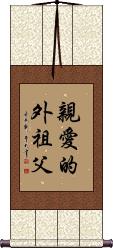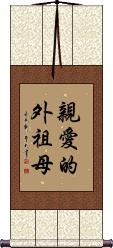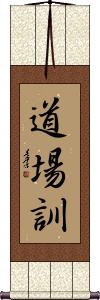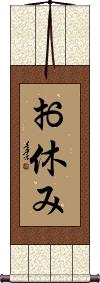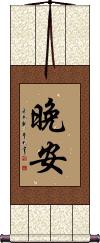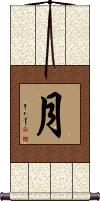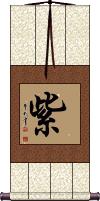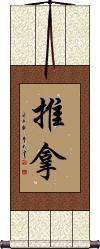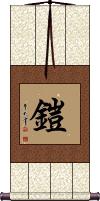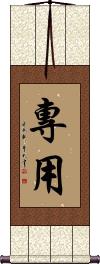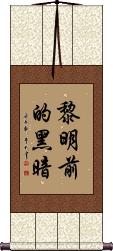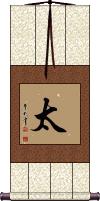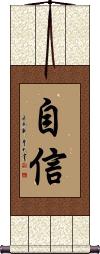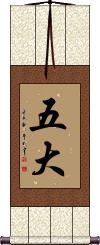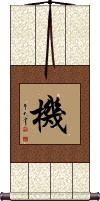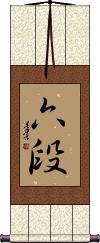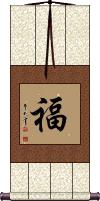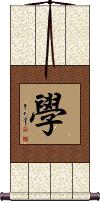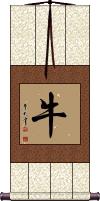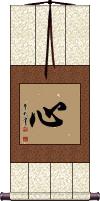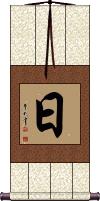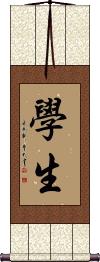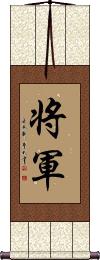Many custom options...
And formats...

Front in Chinese / Japanese...
Buy a Front calligraphy wall scroll here!
Personalize your custom “Front” project by clicking the button next to your favorite “Front” title below...
1. Learn From Your Predecessors
10. Dojo Kun
11. Good Night
12. A Traditional Warm Welcome
13. Good Night
14. Moon
15. Purple / Violet
17. Armor
18. Dedication
19. The Night is Darkest Before the Dawn
20. Hella
21. Self-Confidence
23. Where There is a Will, There is a Way
24. Opportunity
25. Roku-Dan / 6th Degree Black Belt
28. Ox / Bull / Cow
30. United States Marine Corps
31. Day
32. Student
Learn From Your Predecessors
When the cart in front overturns, be cautious with your own
前車之覆后車之鑒 is a Chinese proverb that suggests looking at the circumstances and toils of those you proceeded before you and learning from their experience.
This more literally means “the cart in front overturns, a warning to the following cart.”
This is figuratively translated as “draw a lesson from the failure of one's predecessor,” “learn from past mistakes,” or compared to the English idiom, “once bitten twice shy.”
Other more-direct translations:
Make the overturning of the chariot in front a warning for the chariot behind.
Learn caution through an unpleasant experience.
The wrecked coach in front should be a warning.
The overturned cart in front serves as a warning to the carts behind.
Loving Grandfather
Maternal (Northern China)
Dear Grandfather
Maternal (Northern China)
Dear Grandfather
Maternal (Southern China - Informal)
Dear Grandfather
Paternal (Southern China)
Top Quality / First Class
一流 is the Chinese, Japanese Kanji, and old Korean Hanja for top quality, front-ranking, first-class, top grade, foremost, top-notch, or unique.
Dear Grandfather
Maternal (Southern China)
Dear Grandmother
Paternal (Southern China)
Please Forgive Me
Dear Grandmother
Maternal (Southern China)
Dear Grandmother
Paternal (Northern China)
Dear Grandmother
Maternal (Northern China)
Dear Grandmother
Maternal (Southern China - formal)
Dear Grandfather
Paternal (Northern China)
Dojo Kun
Good Night
お休み is how to write “good night” in Japanese.
It literally means “taking a rest.”
お休み is not a normal title for a calligraphy wall scroll. It might be appropriate for a hotel front desk, if anything.
Note: Because this selection contains some special Japanese Hiragana characters, it should be written by a Japanese calligrapher.
A Traditional Warm Welcome
歡迎光臨 would be the ultimate Chinese “welcome mat.” Except it will be on your wall, and people will not step on it.
In a somewhat literal translation, you could say it means “I feel happy as I welcome you, as you have brought a shining light to this place with your arrival,” or more simply, “I am happy you've come as your presents brightens up the place.”
It has become common for this greeting to be announced by the staff upon the arrival of any customer into a fancy store in China. You will also see these characters on the “welcome mats” in front of 4 and 5-star hotels in China.
Having this on a wall scroll is an extra nice touch. I have seen a few horizontal scrolls with this phrase on the wall behind the reception desk of better hotels or near the front door of fine shops. At the fanciest department stores and restaurants in China, several greeters (almost always young women) will stand by the front door, all wearing sashes with this phrase embroidered. As you walk in, they will bow and say “huan ying guang lin” to welcome you to the establishment.
Note: The first two and last two characters do make words in Korean Hanja but are seldom used as a sentence like this in Korean.
Good Night
Moon
月 is how to write the title for “moon” in Chinese, Korean Hanja, and Japanese Kanji.
月 is also used to refer to the month. This is because China traditionally uses a lunar calendar, so saying “next moon” is the same as saying “next month” etc.
In modern Chinese and Japanese and old Korean, the character for a number is put in front of this moon character to represent western months. So “one moon” is January “two moons” is February etc.
If you are wondering, in the east Asian way to write dates, the character for “sun” or “day” is used with a number in front of it to express the day of the month. So “ten moons, one sun” becomes “October 1st” or “10/1” (this date happens to be Chinese National Day - The equivalent of Independence Day in the USA, Canada Day, or the Queen's Birthday).
In Japanese, 月 can be a surname that romanizes as Tsuki, Tsukizaki, or Takagetsu.
Purple / Violet
紫 is the single-character Chinese, Japanese, and old Korean title for the color violet/purple.
The difference between violet and purple is not really distinguished in Asian languages. However, sometimes a character for “light” is added to the front of this one, which might be closer to the meaning of violet.
Therapeutic Massage
推拿 is “Tui Na,” a Chinese version of therapeutic massage.
The title suggests a pushing and pulling motion.
In reality, this is the most legitimate form of massage in China. Seeing this on a sign in front of a building tells you it's a place for health improvement via massage. No mistaking this for any illicit version of massage.
Armor
Dedication
Dedicated to One Thing
專用 is the dedication you might have to your job or a person.
Trivia: It is the same word used as an adjective in front of the word for “network” to say “dedicated network” in Chinese.
Please note: While this is a word in Korean, the meaning is private or “exclusive use.” So this is best if your audience is Chinese.
See Also: Devotion | Passion | Tenacious | Commitment
The Night is Darkest Before the Dawn
黎明前的黑暗 is the most natural way to write “The night is darkest before the dawn,” in Chinese.
The words break down this way by meaning this way:
1.黎明 dawn or daybreak
2.前 before, in front, ago, former, previous, and/or earlier
3.的 (possessive particle) of
4.黑暗 dark, darkly, or darkness
If you try to understand the Chinese word order and grammar, it's like, “Before dawn is the darkest [time].”
Hella
We struggled to find a word that encompasses the English, “hella” with a meaning like, “really,” “a lot,” “totally,” and/or “very.”
In Chinese, Japanese, and old Korean, 太 is a character that is often said as an adjective in front of other words, to make “good” into “too good,” or “extremely good.”
The meaning of this character from the dictionary is highest, greatest, too (much), very, extremely, fat, grand, magnificent, excellent, or great.
Self-Confidence
自信 is created by simply putting the character for “faith/believe/confidence” with the character for “oneself” in front of it.
The literal translation holds the same meaning in English, Chinese, and Japanese.
It's like a self-affirmation to say, “you can do it.”
Some may also use this to mean self-esteem or a sense of self-worth. 自信 is also how to say “believe in oneself.”
See Also: Confidence
Godai / Five Elements
五大 is the Japanese title for the five elements.
In Japan, the five elements differ slightly from the original Chinese. Therefore, in Japanese philosophy, you have earth, water, fire, wind, and void (space).
The meaning of the first character is 5, but the second character means great or large. Some translate this as the five majors. 大 is only understood as “elements” when you have 五 in front of it.
In Buddhism, this can be short for 五大明王, or the five great and wise kings.
Where There is a Will, There is a Way
A determined effort can move a mountain
愚公移山 is the Chinese proverb (also somewhat known in Japan and Korea) for “the silly old man moves a mountain.”
Figuratively, this means “where there's a will, there's a way.”
Based on a fable of Lord Yu (愚公). He moved the soil of the mountain in front of his house. After years of effort, he finally moved the entire mountain (some versions of the story have God seeing how determined the man was, and sending two angels to whisk the mountains away).
The moral of the story: Anything can be accomplished if one works at it ceaselessly.
The Japanese version of this is 愚公山を移す (gu kou yama wo utsu su). But better to get the Chinese version, since this is originally a Chinese proverb.
See Also: Nothing is Impossible
Opportunity
機 is an odd one - I've seen this on coffee cups and posters with the meaning of “opportunity.”
機 is a correct definition but this character also means “machine.” In fact, if you put the character for “flying” in front of this character, you have the Chinese word for “airplane” (literally: flying machine). Alone, on a wall scroll, it will be generally understood as “opportunity” but I want you to know this extra information before you make your selection. Note that in Japanese and Korean, this has a similar meaning but can also mean machine or loom.
See Also: Success
Roku-Dan / 6th Degree Black Belt
六段 is the Japanese title for the 6th Degree or 6th Level.
This applies mostly to martial arts and earning the title of a 6th-degree black belt.
The first character is simply the number 6.
The second character is “dan” which is often translated as “degree” in the context of Japanese martial arts. 六段 means grade, rank, level. When a number is in front like this, it refers to a senior rank in martial arts or games of strategy such as go, shogi, chess, etc.
Good Luck / Good Fortune
福 is pronounced “fu” in Chinese.
The character “fu” is posted by virtually all Chinese people on the doors of their homes during the Spring Festival (closely associated with the Chinese New Year).
One tradition from the Zhou Dynasty (beginning in 256 B.C.) holds that putting a fu symbol on your front door will keep the goddess of poverty away.
福 literally means good fortune, prosperity, blessed, blessedness, happiness, and fulfillment.
You'll also see this character in Vietnam (where Chinese characters were the written form until a romanization reform) where it is pronounced Phúc - a word commonly used in Vietnamese names because of its good meaning.
See Also: Lucky
Study / Learn / School
學 is “study” or “learn” in Chinese, Japanese Kanji, and old Korean Hanja.
學 is a very broad character that can mean a lot of things related to scholarship. It can refer to a school (in fact, if you put the character for “big” in front of this, you have “college” or “university,” if you put the word for “middle,” you have “middle school.” This can also mean science; the process of acquiring knowledge; learning; scholarship; erudition; knowledge. It can also add the Chinese or Japanese version of “-ology” (the study of) too many words.
![]() There is a very common simplified version of this character. You will see this form in modern Japan and mainland China, Singapore, and other places. If you want this simplified version, please click on the character shown to the right instead of the "select and customize" button above.
There is a very common simplified version of this character. You will see this form in modern Japan and mainland China, Singapore, and other places. If you want this simplified version, please click on the character shown to the right instead of the "select and customize" button above.
Ox / Bull / Cow
Year of the Ox / Bull - Zodiac Sign
牛 is the character for bull, cow, ox, or bovine creature in Chinese, old Korean, and Japanese.
If you were born in the year of the ox/bull/cow, you . . .
Are dedicated to your work.
Are discrete, careful and conscientious.
Value work and family.
Note that in this Chinese character, there is no distinction between bull and cow. All bovine creatures fit into the definition of this character. To distinguish between male and female, another sex-designating character is added in front of this character. Therefore, in China, the energy drink “Red Bull” (Hong Niu) is often translated in the minds of Chinese people as “Red Cow” or even “Red Ox.”
See also our Chinese Zodiac page.
Heart / Mind / Spirit
心 would often be translated as “heart.”
However, because it was believed in Chinese culture for thousands of years that your consciousness and thoughts came from the big red organ in the middle of your chest, it also means “mind” or “spirit” and sometimes even “soul.”
In Korean, beyond heart, mind, and spirit, this character can mean moral, nature, mind, affections, intentions, core, and center. In fact, it is used in Chinese to mean “center” as well but only with another character in front of it. For instance, “medical center” or even “shopping center.” Separately and alone, it will not be read with that “center” meaning unless thought of as “the center of your soul.”
United States Marine Corps
米海兵隊 is the Japanese way to write “United States Marine Corps” or simply “U.S. Marines.”
Breaking down each Kanji, this means:
“rice (American) ocean/sea soldiers/army/military corps/regiment/group.”
This title will only make sense in Japanese, it is not the same in Chinese! Make sure you know your audience before ordering a custom wall scroll.
If you are wondering about rice, America is known as “rice country” or “rice kingdom” when literally translated. The Kanji for rice is often used as an abbreviation in front of words (like a sub-adjective) to make something “American.” Americans say “rice burner” for a Japanese car and “rice rocket” for a Japanese motorcycle. If you did the same in Japanese, it would have the opposite meaning.
Note: I have not verified this but I’ve found this title used for U.S. Marines in Korean articles, so it’s most likely a normal Korean term as well (but only in Korean Hanja).
See Also: Marine Corps | Navy | Army | Art of War | Warrior | Military
This is how to write “day” in Chinese, Japanese, and Korean Hanja.
This can also mean “Sun,” the star in the middle of the Solar system in which we live. In Japanese, it can also mean “sunshine” or even “Sunday.”
When writing the date in modern Chinese and Japanese, putting a number in front of this character indicates the day of the month. Of course, you need to indicate the month too... The month is expressed with a number followed by the character for the moon. So “three moons ten suns” would be “March 10th” or “3/10.”
Note: This is also the first character for the proper name of Japan. Remember that Japan is “The land of the rising sun”? Well, the first character for Japan means “sun” and the second means “origin” so you get the real meaning now. Sometimes, in China, this sun character can be a short name for Japan or a suffix for something of or from Japan.
Student
學生 is how to write “student” in Chinese, pre-WWII Japanese Kanji, and old Korean Hanja.
If you are a “student of life,” this might be an interesting wall scroll to hang in your reading room.
The first character means “study” or “learning.”
The second character means “life” or “birth.” Don't read too much into that second character unless you decide that this means “the birth of studies” or “the life of learning.” Everyone in China, Japan (and those who can read Hanja in Korea) will just read this word with the meaning of “student.”
If you put the character for “little” in front of this word, it becomes “elementary school student.” Prefixed with “middle,” it becomes “middle school student.” Prefixed with “big,” it becomes “university student” (though when these two characters for student are seen alone, it often suggests “university student”). The term “high school student” is written differently.
![]() There is a very common simplified version of the first character for this word. You will see this form in modern Japan and mainland China, Singapore, and other places. If you want this simplified version, please click on the character shown to the right instead of the "select and customize" button above.
There is a very common simplified version of the first character for this word. You will see this form in modern Japan and mainland China, Singapore, and other places. If you want this simplified version, please click on the character shown to the right instead of the "select and customize" button above.
Homosexual Male / Gay Male
You need the male character in front of the word for homosexual in Chinese to create this word.
It's a much nicer way to say “Gay Male” than English words like Fag, Fairy, Sissy, Puff, Poof, Poofster, Swish, or Pansy. Although I suppose it could be used as a substitute for Nancy Boy, Queer, or Queen (for which, last time I checked, my gay friends said were OK in the right context).
For those of you who think China is a restrictive society - there are at least two gay discos in Beijing, the capital of China. It's at least somewhat socially acceptable to be a gay male in China. However, lesbians seem to be shunned a bit.
I think the Chinese government has realized that the 60% male population means not everybody is going to find a wife (every gay male couple that exists means two more women in the population are available for the straight guys), and the fact that it is biologically impossible for men to give birth, may be seen as helping to decrease the over-population in China.
Shogun / Japanese General
将軍 or Shogun, in the simplest definition, is a General, but you could also use words such as commander, lord, overlord, highest ranking, or commanding officer.
The title “Shogun” has held some slightly ambiguous meanings at times in Japanese history.
In the west, when someone mentions “Shogun,” we may be filled with thoughts of gallant warriors. Some might even think of the TV mini-series with Richard Chamberlain. Often westerners use the words, Samurai and Shogun interchangeably, but that's really not technically correct. In the case of the Samurai, the Shogun was a designated (by the emperor) leader of a gild of Samurai. In this context, the Shogun was a Samurai lord. Or effectively, a commanding officer of a company of Samurai - to put it in modern military terms.
Sometimes a Shogun was a general; other times, he was the leader of a military government in Japan - but not a front-line warrior like a Samurai.
Variants of the same characters are used in China for the rank and title of a General of the People's Liberation Army (and the same term and characters have been used for the last 2200 years since the Qin Dynasty).
Martial Arts Master
武芸者 is the Japanese Kanji title for “Martial Arts Master.” It suggests that you have reached at least the level of black belt and are probably to the level where you are ready to become an instructor.
Please consider carefully where you stand before ordering this phrase on a wall scroll. If you are not a master, this will make you look a bit foolish.
If you want to get this as a gift for your master at the dojo. Try to discreetly make sure this term is used in your school. Different schools and styles of Japanese martial arts use different terms. You may notice in the Romaji that the last two characters romanize as “geisha” which means “person skilled in arts” (what a geisha girl really is). The title here has the character for “martial,” “warrior,” and/or “military” in front of it. Therefore the literal translation is “martial art person.”
These Kanji are valid Chinese characters and Korean Hanja, but this title does not really make sense in Chinese and is not often used in Korean, though a Chinese or Korean would be able to guess the meaning by looking at the first and last characters.
This in-stock artwork might be what you are looking for, and ships right away...
Gallery Price: $60.00
Your Price: $36.88
These search terms might be related to Front:
Just as Liquor Turns a Face Red, Gold Turns a Heart Black
Keep Calm in Face of Adversity
Meet the Buddha, Kill the Buddha
Resilient in the Face of Adversity
Until We Meet Again
The following table may be helpful for those studying Chinese or Japanese...
| Title | Characters | Romaji (Romanized Japanese) | Various forms of Romanized Chinese | |
| Learn From Your Predecessors | 前車之覆后車之鑒 前车之覆后车之鉴 | qián chē zhī fù hòu chē zhī jiàn qian2 che1 zhi1 fu4 hou4 che1 zhi1 jian4 qian che zhi fu hou che zhi jian | ch`ien ch`e chih fu hou ch`e chih chien chien che chih fu hou che chih chien |
|
| Loving Grandfather | 慈祥的老爺 慈祥的老爷 | cí xiáng de lǎo ye ci2 xiang2 de lao3 ye ci xiang de lao ye cixiangdelaoye | tz`u hsiang te lao yeh tzuhsiangtelaoyeh tzu hsiang te lao yeh |
|
| Dear Grandfather | 親愛的姥爺 亲爱的姥爷 | qín ài de lǎo ye qin2 ai4 de lao3 ye qin ai de lao ye qinaidelaoye | ch`in ai te lao yeh chinaitelaoyeh chin ai te lao yeh |
|
| Dear Grandfather | 親愛的外公 亲爱的外公 | qín ài de wài gōng qin2 ai4 de wai4 gong1 qin ai de wai gong qinaidewaigong | ch`in ai te wai kung chinaitewaikung chin ai te wai kung |
|
| Dear Grandfather | 親愛的祖父 亲爱的祖父 | qín ài de zǔ fù qin2 ai4 de zu3 fu4 qin ai de zu fu qinaidezufu | ch`in ai te tsu fu chinaitetsufu chin ai te tsu fu |
|
| Top Quality First Class | 一流 | ichiryuu / ichiryu | yī liú / yi1 liu2 / yi liu / yiliu | i liu / iliu |
| Dear Grandfather | 親愛的外祖父 亲爱的外祖父 | qín ài de wài zǔ fù qin2 ai4 de wai4 zu3 fu4 qin ai de wai zu fu qinaidewaizufu | ch`in ai te wai tsu fu chinaitewaitsufu chin ai te wai tsu fu |
|
| Dear Grandmother | 親愛的祖母 亲爱的祖母 | qín ài de zǔ mǔ qin2 ai4 de zu3 mu3 qin ai de zu mu qinaidezumu | ch`in ai te tsu mu chinaitetsumu chin ai te tsu mu |
|
| Please Forgive Me | お許しを | oyurushi wo oyurushiwo | ||
| Dear Grandmother | 親愛的外婆 亲爱的外婆 | qín ài de wài pó qin2 ai4 de wai4 po2 qin ai de wai po qinaidewaipo | ch`in ai te wai p`o chinaitewaipo chin ai te wai po |
|
| Dear Grandmother | 親愛的奶奶 亲爱的奶奶 | qín ài de nǎi nai qin2 ai4 de nai3 nai qin ai de nai nai qinaidenainai | ch`in ai te nai nai chinaitenainai chin ai te nai nai |
|
| Dear Grandmother | 親愛的姥姥 亲爱的姥姥 | qín ài de lǎo lao qin2 ai4 de lao3 lao qin ai de lao lao qinaidelaolao | ch`in ai te lao lao chinaitelaolao chin ai te lao lao |
|
| Dear Grandmother | 親愛的外祖母 亲爱的外祖母 | qín ài de wài zǔ mǔ qin2 ai4 de wai4 zu3 mu3 qin ai de wai zu mu qinaidewaizumu | ch`in ai te wai tsu mu chinaitewaitsumu chin ai te wai tsu mu |
|
| Dear Grandfather | 親愛的爺爺 亲爱的爷爷 | qín ài de yé ye qin2 ai4 de ye2 ye qin ai de ye ye qinaideyeye | ch`in ai te yeh yeh chinaiteyehyeh chin ai te yeh yeh |
|
| Dojo Kun | 道場訓 道場训 | dou jou kun doujoukun do jo kun | ||
| Good Night | お休み | oyasumi | ||
| A Traditional Warm Welcome | 歡迎光臨 欢迎光临 | huān yíng guāng lín huan1 ying2 guang1 lin2 huan ying guang lin huanyingguanglin | huan ying kuang lin huanyingkuanglin |
|
| Good Night | 晚安 | wǎn ān / wan3 an1 / wan an / wanan | ||
| Moon | 月 | tsuki | yuè / yue4 / yue | yüeh |
| Purple Violet | 紫 | murasaki | zǐ / zi3 / zi | tzu |
| Therapeutic Massage | 推拿 | tuī ná / tui1 na2 / tui na / tuina | t`ui na / tuina / tui na | |
| Armor | 鎧 铠 | yoroi | kǎi / kai3 / kai | k`ai / kai |
| Dedication | 專用 专用 | zhuān yòng zhuan1 yong4 zhuan yong zhuanyong | chuan yung chuanyung |
|
| The Night is Darkest Before the Dawn | 黎明前的黑暗 | lí míng qián de hēi àn li2 ming2 qian2 de hei1 an4 li ming qian de hei an limingqiandeheian | li ming ch`ien te hei an limingchienteheian li ming chien te hei an |
|
| Hella | 太 | tai | tài / tai4 / tai | t`ai / tai |
| Self-Confidence | 自信 | jishin | zì xìn / zi4 xin4 / zi xin / zixin | tzu hsin / tzuhsin |
| Godai Five Elements | 五大 | godai | wǔ dà / wu3 da4 / wu da / wuda | wu ta / wuta |
| Where There is a Will, There is a Way | 愚公移山 | yū gōng yí shān yu1 gong1 yi2 shan1 yu gong yi shan yugongyishan | yü kung i shan yükungishan |
|
| Opportunity | 機 机 | hata | jī / ji1 / ji | chi |
| Roku-Dan 6th Degree Black Belt | 六段 | roku dan / rokudan | ||
| Good Luck Good Fortune | 福 | fuku | fú / fu2 / fu | |
| Study Learn School | 學 学 | gaku | xué / xue2 / xue | hsüeh |
| Ox Bull Cow | 牛 | ushi | niú / niu2 / niu | |
| Heart Mind Spirit | 心 | kokoro | xīn / xin1 / xin | hsin |
| United States Marine Corps | 米海兵隊 | bei kai hei tai beikaiheitai | ||
| Day | 日 | hi / nichi | rì / ri4 / ri | jih |
| Student | 學生 学生 | gakusei | xué shēng xue2 sheng1 xue sheng xuesheng | hsüeh sheng hsüehsheng |
| Homosexual Male Gay Male | 男同性戀 男同性恋 | nán tóng xìng liàn nan2 tong2 xing4 lian4 nan tong xing lian nantongxinglian | nan t`ung hsing lien nantunghsinglien nan tung hsing lien |
|
| Shogun Japanese General | 將軍 将军 | shougun / shogun | jiāng jūn jiang1 jun1 jiang jun jiangjun | chiang chün chiangchün |
| Martial Arts Master | 武芸者 | bugeisha | wǔ yún zhě wu3 yun2 zhe3 wu yun zhe wuyunzhe | wu yün che wuyünche |
| In some entries above you will see that characters have different versions above and below a line. In these cases, the characters above the line are Traditional Chinese, while the ones below are Simplified Chinese. | ||||
Successful Chinese Character and Japanese Kanji calligraphy searches within the last few hours...
